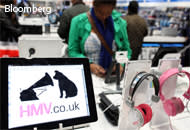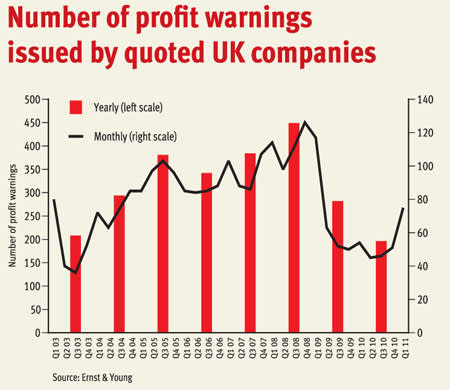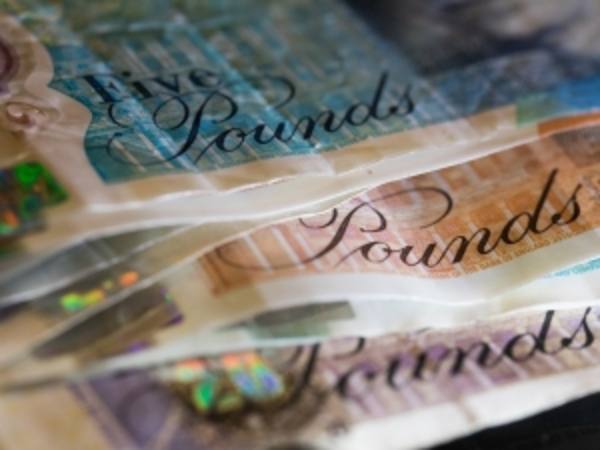Last week cruise operator Carnival and Imperial Tobacco both warned on profit expectations on the same day. Carnival blamed political unrest in the Middle East and natural disasters for the shortfall, while Imperial attributed its failure to meet expectations to price cuts in the highly competitive Spanish market. The key question for investors in these two, and indeed all other companies, is whether to sell at the first sign of trouble, or to tough it out in the hope of better times.
According to research from Ernst & Young, a whopping 75 UK-listed companies issued profit warnings in the first three months of 2011 alone. This is 39 per cent higher than the number recorded in last year's corresponding quarter – and the highest number recorded since the first quarter of 2009, when 117 warnings were issued.
Most of the recent warnings have been from retailers, although other ailing sectors included travel and leisure, support services, media and software.
Transient trouble…
Companies always want you to believe that profit warnings are down to temporary factors that will soon pass. And in many cases, they are. Nobody could have predicted last year's volcanic ash cloud, which prompted many travel companies to warn, while the good old British weather – one of the most common culprits in profit warnings – played havoc with the whole economy in the final quarter of 2010, not just a few retailers. Many support service companies blamed a hiatus in decision-making around the election for a slowdown in orders. Companies should be able to pass on higher raw material and energy costs, although the process may take a while. It may be some time, too, before the squeeze on household incomes abates.
…or fundamental failure?
However, short-term factors may be used as a fig leaf for deeper, structural problems. Some companies have failed to adjust to the severity of the UK's downturn and its impact on spending. A good example is Carpetright. Britain's biggest floorcoverings retailer issued its third profit warning in April, citing rising raw material costs and increasing consumer reluctance to make big-ticket purchases. The only reason shares in the retailer have not tanked is because its founder, Lord Harris of Peckham, holds such a large stake in the company. We advised dumping shares in Carpetright recently, and they are still a live sell tip.
HMV, the music and movies retailer, which also owns bookseller Waterstones, has issued a raft of profit warnings as its business becomes increasingly threatened and cannibalised by digital downloads and supermarket competition. The group has recently been thrown a lifeline in the form of a £220m debt refinancing, although the lenders now have HMV firmly over a barrel. HMV is also unashamedly scrambling for cash – it's in the middle of selling Waterstones to Russian tycoon Alexander Mamut for £53m, and is soon to conclude the disposal of its Canadian business. The group claims to be focusing on a digital strategy – selling the home entertainment hardware as opposed to home entertainment products. But we remain non-believers. If consumers can buy DVDs online, they can buy DVD players online too.
Other companies that have issued more than one profit warning include Mothercare, Alterian, Pace and Cable & Wireless Worldwide.
But there are some companies that are not the victim of macroeconomics, and as such may be worth a punt. The picks below are based on sectoral and company-specific factors – but be warned, these investments are not for widows or orphans.












